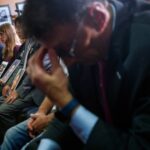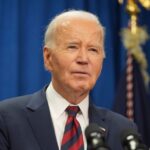
Authored by Janice Hisle via The Epoch Times (emphasis ours),
When America’s first law banning “gender transition procedures” for minors was passed in Arkansas last year, it spawned a wave of similar legislation.
But legislative proposals in a dozen other states withered on the vine, while the Arkansas law faced an immediate court challenge that temporarily blocked the law from taking effect in July 2021.

Since then, Alabama and Arizona moved forward and passed their own versions of the Arkansas act, while California took a 180-degree turn to counteract the bans. Last month, California became the nation’s first “sanctuary” state welcoming out-of-state youths who seek puberty blockers, cross-sex hormones, and surgeries.
And now, the Arkansas law, called the Save Adolescents From Experimentation (SAFE) Act, remains closely watched from all sides as it heads to trial in Little Rock starting Oct. 17.
The outcome will determine how lawmakers and activists nationwide plan their next moves in the evolving controversy over medical intervention for transgender-identifying minors.
‘Necessary’ or ‘Experimental’?
U.S. District Court Judge James Moody Jr. must decide a case that pits the American Civil Liberties Union (ACLU) against Arkansas officials who are defending the SAFE Act.
The ACLU contends that the SAFE Act unconstitutionally denies “medically necessary” treatments for youths suffering from gender dysphoria, which is persistent distress about one’s gender.
In its lawsuit, the ACLU is representing four gender-dysphoric children, ages 9 to 16 at the time of the filing in May 2021, and two doctors who provide “gender-affirming care.”
The children’s parents described seeing marked improvements in attitude and reduced anxiety after counseling and, in some cases, treatments with hormones.
The parents worry about what would happen to their children if the law were to take effect, requiring the treatment to abruptly stop.
Arkansas Attorney General Leslie Rutledge counters that the state is obligated to protect juveniles from “experimental” treatments that can permanently alter their still-developing bodies. She and other supporters of the SAFE Act say that long-term effects of the treatments remain unknown.
Multiple Appeals Likely
The case serves as the nation’s first test of the constitutionality of this type of law, Danielle Weatherby, an associate professor at the University of Arkansas School of Law, told The Epoch Times.
Regardless of which way the judge rules, “this is just the beginning of a wild ride,” Weatherby said.
She predicts multiple appeals will follow, along with legislative proposals in a number of states.
From a legal standpoint, Moody’s decision will be considered a precedent only within the Eighth Circuit, a six-state federal court region that includes Arkansas.
At least two Eighth Circuit states, Iowa and Missouri, had introduced bills resembling the SAFE Act. (The remaining states are Nebraska, North Dakota, and South Dakota.)
If the ACLU prevails and Moody strikes down the SAFE Act, “it will mean that any state that is in the Eighth Circuit will not be permitted to pass one of these laws,” Weatherby said.
When Moody agreed to temporarily block Arkansas from implementing the SAFE Act, he was required to base that decision on a “reasonable likelihood” that the ACLU would prevail in its lawsuit.
Arkansas sought a reversal of Moody’s decision, but the U.S. Court of Appeals for the Eighth Circuit upheld the preliminary injunction.
Thus, Moody’s court and the appeals court both appear to have telegraphed that they’re leaning toward the ACLU’s contentions in the case.
But Moody is expected to have five long days of testimony to mull over, leaving open the possibility that he still may uphold the SAFE Act.
Court Disputes ‘Reversible’ Tag
On a personal level, Weatherby said she cares about the outcome of the case because she knows several transgender people and their families.
“I know that firsthand, having worked with transgender children, they do not make this decision lightly,” to undergo gender-altering medical procedures, she said. “And I think that gets lost in the conversation.”
She also is aware of the debate over whether “gender-affirming care” is safe and effective. She said that’s a decision each family has to make, in consultation with doctors, and “do the best we could do with the knowledge we have, because these kids are suffering from certain fear, anxiety and depression.”
One atypical argument in favor of the SAFE Act relies on a British court ruling, as opposed to one in the United States.
“When there’s no precedent, we look elsewhere,” Weatherby said.
Rutledge, the attorney general, wrote, “The SAFE Act responds to widespread, growing international concerns” over body-altering medical treatments being performed on minors’ still-developing bodies.
She noted that, a few months before the SAFE Act was approved, the high court in the United Kingdom “determined that children likely cannot ever understand the irreversible consequences of using puberty-blocking drugs as a transition procedure.”
The UK court also disputed assertions that puberty blockers’ effects are “fully reversible,” if the patient stops using the medications.
Instead, the court found: “Missed development and experience, during adolescence, can never truly be recovered or ‘reversed.’”
In its initial complaint against Arkansas, the ACLU declared: “Puberty-delaying treatment is reversible.” But further down on the same page, the ACLU cites professional guidelines describing the “partly irreversible effects” of those prescriptions.
Such conflicts arise because the science is unsettled, Arkansas officials have argued.
Odd Battle Lines Drawn
Another unusual aspect of the case: The unexpected mix of people on both sides.
A large number of medical organizations, including the American Medical Association and the American Academy of Pediatrics have thrown their support behind the ACLU, along with other groups supporting civil rights and LGBT rights, plus 20 states, predominantly Democrat, as The Epoch Times reported in a previous story.
On the other side, backers of the SAFE Act include 19 mostly Republican-dominated states, along with a number of “detransitioners,” who say medical transitioning didn’t solve their problems—it just created more issues. Those people express regret over their gender-altering medications and surgeries.
Additional supporters of the SAFE Act include a handful of individual doctors, the conservative Family Research Council, and a nationwide feminist group, the Women’s Liberation Front.
The somewhat unexpected alliances within each camp show “what an anomaly this case is,” attorney Vernadette Broyles told The Epoch Times.
Broyles, who holds a Harvard University law degree and an undergraduate biology degree from Yale University, is positioned as a rare authoritative voice when legal and medical battles intersect.
Conveyor Belt Approach?
Broyles and her team with the Child and Parental Rights Campaign filed a brief that shares stories of 10 families whom the SAFE Act would have protected.
Read more here...
Authored by Janice Hisle via The Epoch Times (emphasis ours),
When America’s first law banning “gender transition procedures” for minors was passed in Arkansas last year, it spawned a wave of similar legislation.
But legislative proposals in a dozen other states withered on the vine, while the Arkansas law faced an immediate court challenge that temporarily blocked the law from taking effect in July 2021.

Since then, Alabama and Arizona moved forward and passed their own versions of the Arkansas act, while California took a 180-degree turn to counteract the bans. Last month, California became the nation’s first “sanctuary” state welcoming out-of-state youths who seek puberty blockers, cross-sex hormones, and surgeries.
And now, the Arkansas law, called the Save Adolescents From Experimentation (SAFE) Act, remains closely watched from all sides as it heads to trial in Little Rock starting Oct. 17.
The outcome will determine how lawmakers and activists nationwide plan their next moves in the evolving controversy over medical intervention for transgender-identifying minors.
‘Necessary’ or ‘Experimental’?
U.S. District Court Judge James Moody Jr. must decide a case that pits the American Civil Liberties Union (ACLU) against Arkansas officials who are defending the SAFE Act.
The ACLU contends that the SAFE Act unconstitutionally denies “medically necessary” treatments for youths suffering from gender dysphoria, which is persistent distress about one’s gender.
In its lawsuit, the ACLU is representing four gender-dysphoric children, ages 9 to 16 at the time of the filing in May 2021, and two doctors who provide “gender-affirming care.”
The children’s parents described seeing marked improvements in attitude and reduced anxiety after counseling and, in some cases, treatments with hormones.
The parents worry about what would happen to their children if the law were to take effect, requiring the treatment to abruptly stop.
Arkansas Attorney General Leslie Rutledge counters that the state is obligated to protect juveniles from “experimental” treatments that can permanently alter their still-developing bodies. She and other supporters of the SAFE Act say that long-term effects of the treatments remain unknown.
Multiple Appeals Likely
The case serves as the nation’s first test of the constitutionality of this type of law, Danielle Weatherby, an associate professor at the University of Arkansas School of Law, told The Epoch Times.
Regardless of which way the judge rules, “this is just the beginning of a wild ride,” Weatherby said.
She predicts multiple appeals will follow, along with legislative proposals in a number of states.
From a legal standpoint, Moody’s decision will be considered a precedent only within the Eighth Circuit, a six-state federal court region that includes Arkansas.
At least two Eighth Circuit states, Iowa and Missouri, had introduced bills resembling the SAFE Act. (The remaining states are Nebraska, North Dakota, and South Dakota.)
If the ACLU prevails and Moody strikes down the SAFE Act, “it will mean that any state that is in the Eighth Circuit will not be permitted to pass one of these laws,” Weatherby said.
When Moody agreed to temporarily block Arkansas from implementing the SAFE Act, he was required to base that decision on a “reasonable likelihood” that the ACLU would prevail in its lawsuit.
Arkansas sought a reversal of Moody’s decision, but the U.S. Court of Appeals for the Eighth Circuit upheld the preliminary injunction.
Thus, Moody’s court and the appeals court both appear to have telegraphed that they’re leaning toward the ACLU’s contentions in the case.
But Moody is expected to have five long days of testimony to mull over, leaving open the possibility that he still may uphold the SAFE Act.
Court Disputes ‘Reversible’ Tag
On a personal level, Weatherby said she cares about the outcome of the case because she knows several transgender people and their families.
“I know that firsthand, having worked with transgender children, they do not make this decision lightly,” to undergo gender-altering medical procedures, she said. “And I think that gets lost in the conversation.”
She also is aware of the debate over whether “gender-affirming care” is safe and effective. She said that’s a decision each family has to make, in consultation with doctors, and “do the best we could do with the knowledge we have, because these kids are suffering from certain fear, anxiety and depression.”
One atypical argument in favor of the SAFE Act relies on a British court ruling, as opposed to one in the United States.
“When there’s no precedent, we look elsewhere,” Weatherby said.
Rutledge, the attorney general, wrote, “The SAFE Act responds to widespread, growing international concerns” over body-altering medical treatments being performed on minors’ still-developing bodies.
She noted that, a few months before the SAFE Act was approved, the high court in the United Kingdom “determined that children likely cannot ever understand the irreversible consequences of using puberty-blocking drugs as a transition procedure.”
The UK court also disputed assertions that puberty blockers’ effects are “fully reversible,” if the patient stops using the medications.
Instead, the court found: “Missed development and experience, during adolescence, can never truly be recovered or ‘reversed.’”
In its initial complaint against Arkansas, the ACLU declared: “Puberty-delaying treatment is reversible.” But further down on the same page, the ACLU cites professional guidelines describing the “partly irreversible effects” of those prescriptions.
Such conflicts arise because the science is unsettled, Arkansas officials have argued.
Odd Battle Lines Drawn
Another unusual aspect of the case: The unexpected mix of people on both sides.
A large number of medical organizations, including the American Medical Association and the American Academy of Pediatrics have thrown their support behind the ACLU, along with other groups supporting civil rights and LGBT rights, plus 20 states, predominantly Democrat, as The Epoch Times reported in a previous story.
On the other side, backers of the SAFE Act include 19 mostly Republican-dominated states, along with a number of “detransitioners,” who say medical transitioning didn’t solve their problems—it just created more issues. Those people express regret over their gender-altering medications and surgeries.
Additional supporters of the SAFE Act include a handful of individual doctors, the conservative Family Research Council, and a nationwide feminist group, the Women’s Liberation Front.
The somewhat unexpected alliances within each camp show “what an anomaly this case is,” attorney Vernadette Broyles told The Epoch Times.
Broyles, who holds a Harvard University law degree and an undergraduate biology degree from Yale University, is positioned as a rare authoritative voice when legal and medical battles intersect.
Conveyor Belt Approach?
Broyles and her team with the Child and Parental Rights Campaign filed a brief that shares stories of 10 families whom the SAFE Act would have protected.
Read more here…







